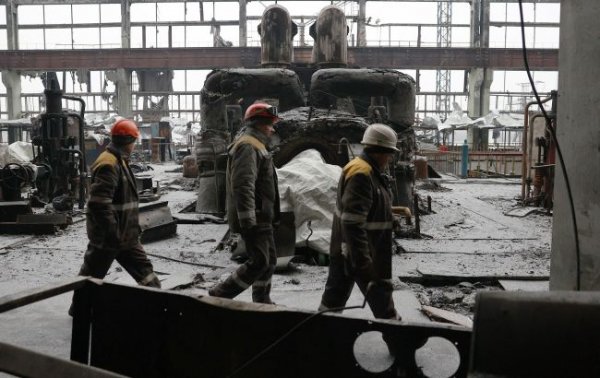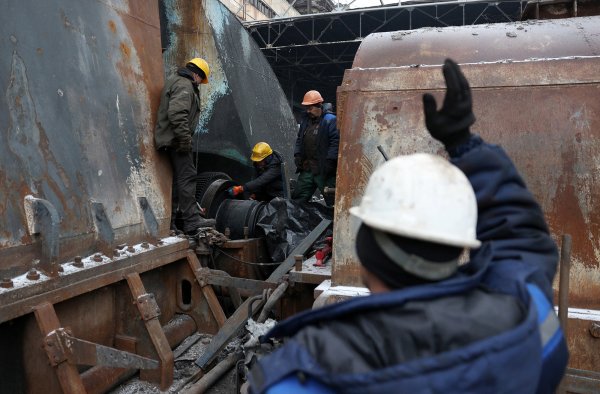
A destroyed Ukrainian thermal power plant (Photo: Getty Images) Author: Roman Kot
With US mediation, Ukraine and Russia agreed to stop attacks on energy and port infrastructure. And just a few days later, Russia questioned its implementation.
RBC-Ukraine provides an answer to the main question: is this limited ceasefire still in force – or is it no longer?
Content:
- What happened to the energy truce?
- Why Russia has hit the energy sector
- The ceasefire agreement – how it happened
What happened to the energy truce?
The agreements between Ukraine, the United States and Russia meant that the parties would refrain from attacks on energy facilities for a certain period of time.
Following the talks in Saudi Arabia, the White House released two statements. The first was about the results of the meeting of expert groups of the United States and Russia. According to the statement, the United States and Russia agreed to “develop measures” to implement the agreement between Trump and Putin to ban strikes on energy facilities of Russia and Ukraine.
A similar provision was made in the second statement – after the meeting of the Ukrainian and American teams. “The United States and Ukraine agreed to develop measures to implement the agreement between President Trump and President Zelensky on the ban on strikes on energy facilities in Russia and Ukraine,” the statement said.
The US and Russia's statement also included a clause stating that the United States would help restore Russia's access to the global market for agricultural and fertilizer exports. This concerned another type of truce – at sea. And subsequently, Russia rolled out a whole list of demands under which it would allegedly agree not to fight in the Black Sea, primarily the lifting of a number of sanctions. In general, the story with the maritime truce seems to have been put on hold for now – after all, in this case, it is Europe that should lift the sanctions. And there is no enthusiasm for this there. In addition, the very idea of a maritime truce does not make much sense in itself – after all, large-scale military operations in the Black Sea have not been conducted for a long time without it.
As for energy, the scale of Russian attacks during March 18-26 (after the conversation between Trump and Putin) really decreased. Strikes at individual facilities continued during this time, but not in such large waves as, say, in December or January. Ukraine, after the talks in Riyadh, also did not strike at Russian energy, although the aggressors constantly tried to blame it for this.
This state of affairs continued until March 27, when Russia dealt a powerful blow to Kherson. And on the night of March 28, the aggressor country attacked oil and gas industry facilities in Poltava. At the same time, Zelensky said that the shelling of Kherson was a clear violation of the energy truce.
In return, Moscow continues to accuse Ukraine of attacks on Russian energy. In particular, the Russian Defense Ministry stated that Ukrainian troops attacked a gas metering station in Sudzha.
At a briefing on March 28, Zelensky said that the mechanism for monitoring compliance with the energy ceasefire had not yet been developed. It was to be developed by the United States with the participation of third countries. According to him, the United States should respond to the violation of the agreements. Zelensky instructed Defense Minister Rustem Umerov to transfer all the necessary evidence to Washington.
“While there are no third countries that will be responsible for monitoring, the contact for us is the United States of America. I asked Umerov, he will take from the State Emergency Service, from the Minister of Internal Affairs, all the information from the power engineers, from our air defense, from everyone – and comment on this to the American side,” Zelensky said.
At the same time, there is no clear answer to the key question: does Ukraine consider itself free from obligations not to strike at Russia's energy sector and to observe the ceasefire after the Russian strikes? Considering the appeals to the Americans, it seems that Ukraine is not planning to get involved in a new round of exchanging powerful strikes on energy sector.
In addition, the positions of Ukraine and Russia regarding the start and end dates of the energy truce differ. Russia believes that it began on March 18, when Trump and Putin spoke. Ukraine insists that the ceasefire began on March 25, when technical negotiations in Saudi Arabia ended.
Why Russia has hit the energy sector
Russia does not need any peace processes now, because the Kremlin believes that it has time and opportunities to improve its positions, political scientist and president of the Analytical Center “Politics” Oleg Lesnoy told RBC-Ukraine.
“Whether this is true or not, time will tell, but they (the Russians – ed.) are sure of it. This is evidenced by Putin's rhetoric, who increasingly appears in uniform. Previously, he did not wear it, but now he was there and in Kursk, it seems, and on the submarine he says something about the illegitimacy of the Ukrainian government. It's all about delays,” Lesnoy said.
According to him, the contacts that took place in Saudi Arabia and by telephone are consultations before major negotiations. However, in the near future they are unlikely, because there is no real constructiveness from the Russian Federation. The fact that it is still too early for a meeting at a high political level was also acknowledged by US Secretary of State Marco Rubio.

Workers at the destroyed power plant (Photo: Getty Images)
“The Russian Federation is using the old method: they don't say no, but they don't say yes either, or they demonstrate some kind of “half-position”, which they then destroy, then set other conditions again, and so on until they achieve their result. What they want now is not peace, but to deceive Trump so that he will ease sanctions,” Lesnoy told the publication.
In this situation, decisive action should not be expected from the United States, political scientist and PhD in philosophy Andrey Gorodnitsky told the RBC-Ukraine YouTube channel.
“Until there is a ceasefire, Trump, like an eel on a frying pan, will jump and say: let's push this to the end, let's be patient a little longer. Because it is Ukraine that is being hit, not the United States of America. And they are comfortable in this regard. And that is why the Russians are taking advantage of this,” Gorodnitsky said.
At the same time, according to the expert, Trump is gradually beginning to understand that Russia is manipulating him. “Trump himself, it seems to me, no longer believes in this (achieving a ceasefire before 100 days of his presidency – ed.). And with each negotiation, he sees that he is being led by the nose. He is finally beginning to see the light, he is beginning to understand that the issue here is not about Ukraine,” he emphasized.
Therefore, the US needs to at least develop a “plan B”. After all, if Trump's diplomatic efforts fail, it will mean the end of the US as a hegemon in the world.
The ceasefire agreement – how it happened
The ceasefire was preceded by several rounds of talks in Saudi Arabia and telephone conversations at the level of state leaders. In mid-March, the Ukrainian and American teams met in the city of Jeddah, where Ukraine supported the US proposal for a full 30-day ceasefire. However, Russia voiced a number of warnings. After that, US President Donald Trump held talks with Vladimir Putin and Volodymyr Zelensky. As a result, the parties reached only a limited energy and maritime ceasefire.
The details were finalized on March 23-25 at the technical level in Saudi Arabia's Riyadh. The Ukrainian and Russian delegations did not meet directly. They were in different rooms, but the United States acted as a mediator between them.
Also, Russia did not want to discuss stopping strikes on civilian infrastructure at the talks in Riyadh, said Deputy Head of the Office of the President of Ukraine Ihor Zhovkva. According to him, the Russian delegation stated that it did not have the relevant mandate.
At the same time, the representative of the Ukrainian Foreign Ministry Georgiy Tykhyi said on March 27 that new rounds of negotiations involving Ukraine, the United States and Russia are expected. However, specific dates are not yet known. Probably, the United States is still working out a strategy for further negotiations. And the situation with the energy truce is currently hanging in the air.
When writing the material, official announcements on the White House website, statements by Ukrainian President Volodymyr Zelensky, and comments by political scientists Oleg Lesnoy and Andrey Gorodnitsky were used.
